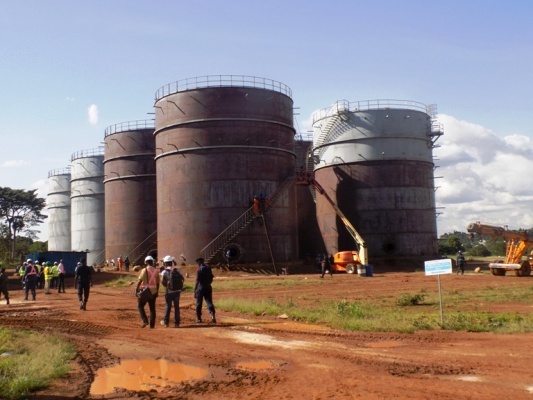Uganda’s former Finance Minister the late Jehoash Mayanja-Nkangi will remain a pillar in Uganda’s history for he was a rare politician, who played a key role in turning around Uganda’s economy when it was on its knees. During the Funeral Service of the late Mayanja Nkangi held at Ntinda, Kampala on March 8, 2017, Prof. Emmanuel Tumusiime-Mutebile, Governor, Bank of Uganda paid touching tribute to the man who was deemed by many as one of the wisest men Uganda has ever produced. Below is Mutebile’s tribute to Nkangi;

I have very fond memories of Jehoash Mayanja Nkangi, who was one of the finest public servants this country has ever had; a man of wisdom, courage, self-sacrifice and humility.
I had the privilege of serving under him for the best part of a decade, when he was first the Minister of Planning and Economic Development, from 1989 to 1992, and then Minister of Finance, Planning and Economic Development from 1992 to 1998, and I was the permanent secretary in those ministries.
It was in that period, from the late 1980s to the late 1990s, that Uganda’s economic fortunes were turned around. After a prolonged period of economic crisis and a collapse in living standards of the population, the implementation of radical economic reforms put the economy back on its feet and laid the foundation for the sustained recovery of the economy and the remarkable decline in the incidence of poverty that Uganda has achieved over the last 25 years.
These achievements will rank very high among the lasting legacy which Mayanja Nkangi has left to his country.
The Late Mayanja Nkangi provided the political leadership for the two ministries which were at the forefront of designing and implementing the reforms which transformed our economy. In doing so, he displayed not only a remarkable insight into the economic challenges facing Uganda, but also tremendous political courage in fighting for, and winning, the battle for economic reform at a time when there still was reluctance to embrace reforms, especially those pertaining to the exchange rate, among both the political leadership and senior public officials.
When the Late Mayanja Nkangi became Minister of Planning and Economic Development in 1989, our economy was suffering from triple digit inflation, acute shortages of foreign exchange and the collapse of production in key sectors of the economy such as the coffee industry and other export industries which had been rendered uncompetitive by a grossly overvalued real exchange rate.
Under his leadership, the ministry spearheaded exchange rate reform, which was, at that time, the single most important reform needed for economic recovery.
In 1990, the parallel market for foreign exchange was legalised and the official exchange rate was devalued. This allowed for the subsequent unification of official and parallel exchange rates at rates which were determined in the market and which, in turn, helped to restore competitiveness to the export sectors.
Alongside the liberalisation of coffee marketing, exchange rate reform led to a strong recovery of exports which boosted the supply of foreign exchange to the economy. Greater availability of foreign exchange and its allocation through the market eased the most critical constraint facing the economy, the acute shortages of foreign exchange.
As a result, as foreign exchange became more accessible to those sectors of the economy which needed it the most, economic output began to recover; sustainable real growth was restored to the economy.
While the Late Mayanja Nkangi was Minister of Economic Planning and Development, inflation was still rampant. This was mainly because the Central Bank had to print money to finance large fiscal deficits. The next critical reform now required was to bring inflation under control.
In March 1992, the Ministry of Economic Planning and Development and the Ministry of Finance were merged into a single ministry, under the political leadership of Mayanja Nkangi.
He understood that, however painful and difficult this was, inflation could only be brought under control through fiscal discipline, so that money no longer had to be printed to finance budget deficits.
The Late Minister Mayanja Nkangi realized that strict control of public expenditure was unavoidable if Uganda was to escape from the ravages of chronic high inflation.
Not surprisingly, control of public expenditure does not endear a finance minister to his colleagues in Government, but Mayanja Nkangi was determined to restore discipline to public finances.
With the support of H.E. the President, he led the implementation, by the newly created Ministry of Finance, Planning and Economic Development, of cash flow management budgeting, which involved restricting releases of money for spending by ministries and other Government agencies to the budgetary resources which could be mobilised from tax revenues and donor aid.
The printing of money to finance budget deficits ceased, and as a consequence inflation was quickly brought under control and restored to single digits, where it remained throughout the rest of Mayanja Nkangi’s six year tenure as Minister of Finance.
The Late Mayanja Nkangi was thus instrumental in providing the political leadership for the two most important economic reforms in the history of our country. He restored the economy’s external balance through exchange rate reform and the economy’s internal balance through fiscal reform. Besides these two critical reforms, several other important reforms were implemented under his political leadership.
These reforms included the establishment, in 1991 of the Uganda Revenue Authority as an autonomous agency for tax administration and the reform of the tax policy, notably through the enactment of modern tax legislation such as the Income Tax Act.
In 1992 Uganda removed export taxes and rationalised the structure of import tariffs, reducing tariffs on most imports to moderate levels while also removing non-tariff barriers.
Trade liberalisation proved crucial in supporting the sustainable real growth of output that the Ugandan economy achieved in the 25 years since these reforms were implemented.
The Ministry of Finance, Planning and Economic Development reformed the planning of the budget with the adoption of the Medium Term Expenditure Framework in the 1990s, to align the budget with the strategic expenditure priorities of the Government. The Ministry also prepared the first Poverty Eradication Action Plan in 1997, which provided strategic direction for expenditure priorities and which was vital in enabling Uganda to access comprehensive external debt relief through the Highly Indebted Poor Countries Initiative in the late 1990s.
It is a measure of the quality and importance of the economic reforms implemented under the leadership of Mayanja Nkangi that they have all stood the test of time and are still in place today, two decades after they were first implemented.
It is often asked of public figures how they will be judged by history. Of Mayanja Nkangi I have no doubt that in many decades to come he will be remembered as one of the most consequential political leaders ever to serve our nation; a man who profoundly shaped the economic history of Uganda and in doing so generated immeasurable benefits for the Ugandan people. All Ugandans have reason to look back on his life with pride, affection and gratitude for the way in which he served his country and its people.
I leave you with the words of John Milton, which seem particularly appropriate for this occasion;
“Nothing is here for tears, nothing to wail or knock the breast; no weakness, no contempt, Dispraise or blame; nothing but well and fair, and what may quiet us in a death so noble.”
May his soul rest in peace.





